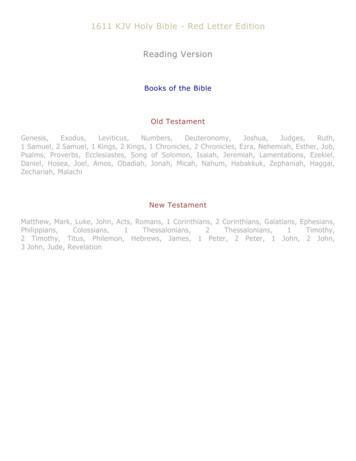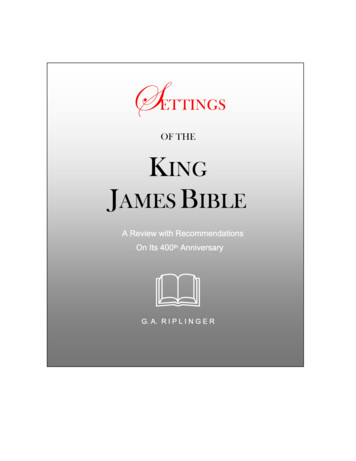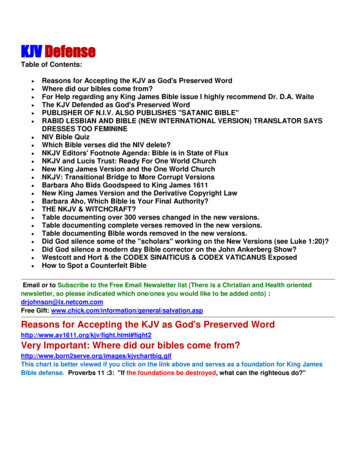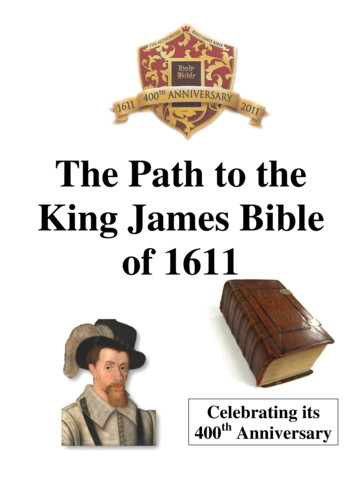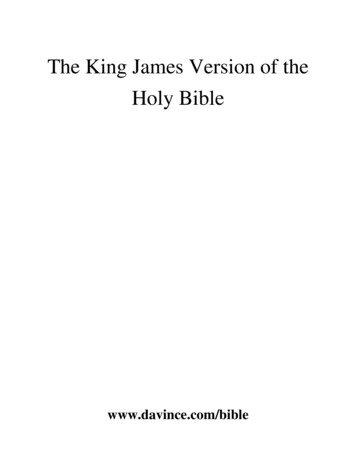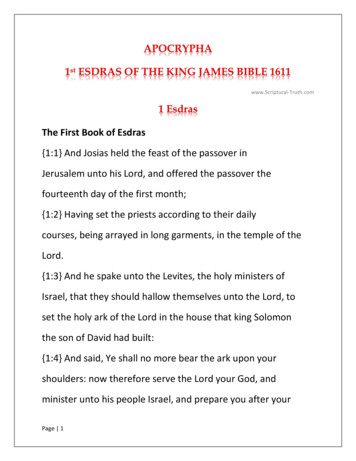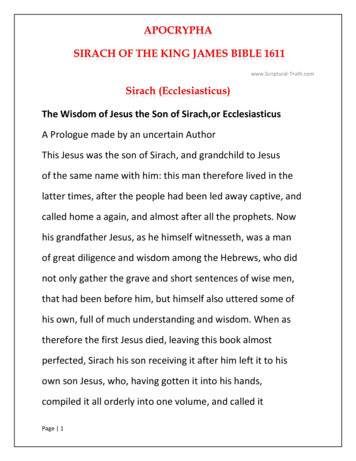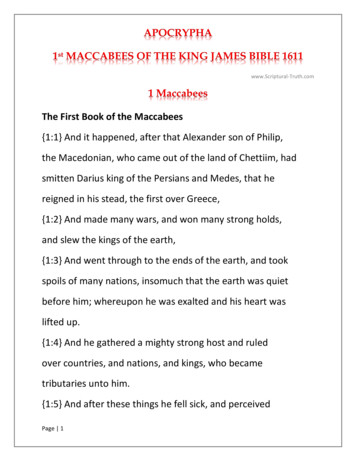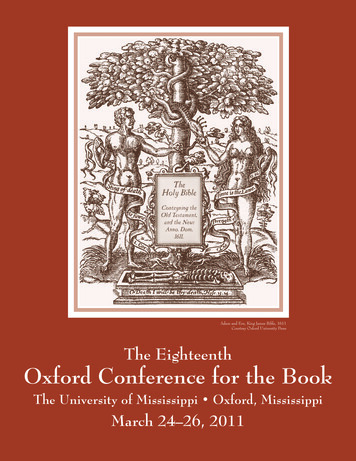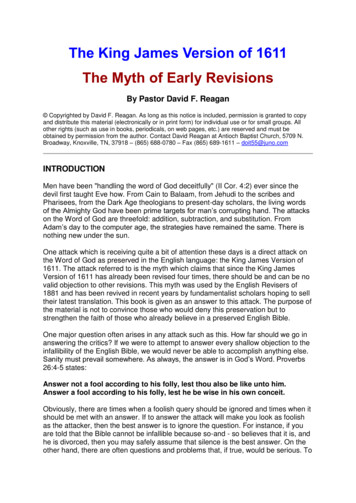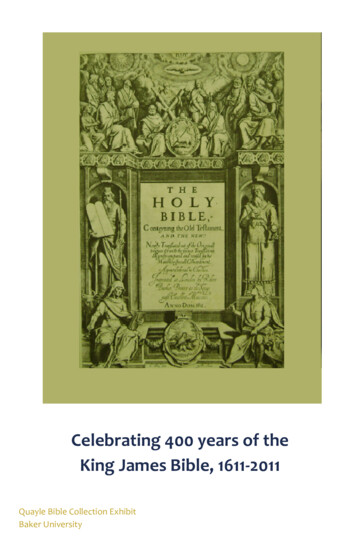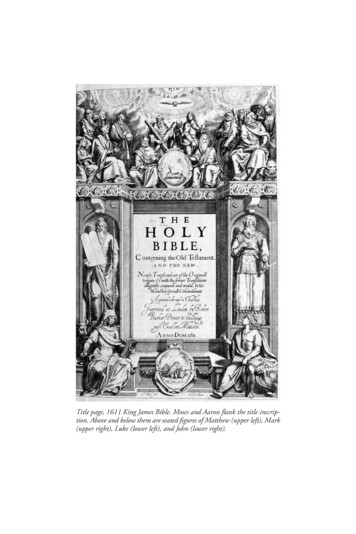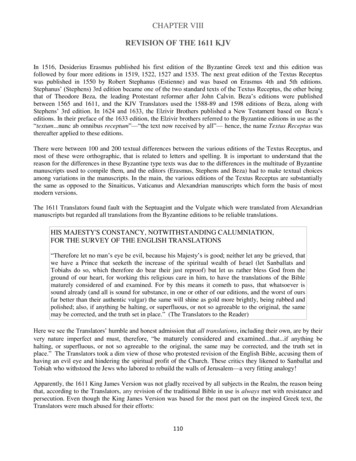
Transcription
CHAPTER VIIIREVISION OF THE 1611 KJVIn 1516, Desiderius Erasmus published his first edition of the Byzantine Greek text and this edition wasfollowed by four more editions in 1519, 1522, 1527 and 1535. The next great edition of the Textus Receptuswas published in 1550 by Robert Stephanus (Estienne) and was based on Erasmus 4th and 5th editions.Stephanus‘ (Stephens) 3rd edition became one of the two standard texts of the Textus Receptus, the other beingthat of Theodore Beza, the leading Protestant reformer after John Calvin. Beza‘s editions were publishedbetween 1565 and 1611, and the KJV Translators used the 1588-89 and 1598 editions of Beza, along withStephens‘ 3rd edition. In 1624 and 1633, the Elzivir Brothers published a New Testament based on Beza‘seditions. In their preface of the 1633 edition, the Elzivir brothers referred to the Byzantine editions in use as the―textum.nunc ab omnibus receptum‖—―the text now received by all‖— hence, the name Textus Receptus wasthereafter applied to these editions.There were between 100 and 200 textual differences between the various editions of the Textus Receptus, andmost of these were orthographic, that is related to letters and spelling. It is important to understand that thereason for the differences in these Byzantine type texts was due to the differences in the multitude of Byzantinemanuscripts used to compile them, and the editors (Erasmus, Stephens and Beza) had to make textual choicesamong variations in the manuscripts. In the main, the various editions of the Textus Receptus are substantiallythe same as opposed to the Sinaiticus, Vaticanus and Alexandrian manuscripts which form the basis of mostmodern versions.The 1611 Translators found fault with the Septuagint and the Vulgate which were translated from Alexandrianmanuscripts but regarded all translations from the Byzantine editions to be reliable translations.HIS MAJESTY'S CONSTANCY, NOTWITHSTANDING CALUMNIATION,FOR THE SURVEY OF THE ENGLISH TRANSLATIONS―Therefore let no man‘s eye be evil, because his Majesty‘s is good; neither let any be grieved, thatwe have a Prince that seeketh the increase of the spiritual wealth of Israel (let Sanballats andTobiahs do so, which therefore do bear their just reproof) but let us rather bless God from theground of our heart, for working this religious care in him, to have the translations of the Biblematurely considered of and examined. For by this means it cometh to pass, that whatsoever issound already (and all is sound for substance, in one or other of our editions, and the worst of oursfar better than their authentic vulgar) the same will shine as gold more brightly, being rubbed andpolished; also, if anything be halting, or superfluous, or not so agreeable to the original, the samemay be corrected, and the truth set in place.‖ (The Translators to the Reader)Here we see the Translators‘ humble and honest admission that all translations, including their own, are by theirvery nature imperfect and must, therefore, ―be maturely considered and examined.that.if anything behalting, or superfluous, or not so agreeable to the original, the same may be corrected, and the truth set inplace.‖ The Translators took a dim view of those who protested revision of the English Bible, accusing them ofhaving an evil eye and hindering the spiritual profit of the Church. These critics they likened to Sanballat andTobiah who withstood the Jews who labored to rebuild the walls of Jerusalem—a very fitting analogy!Apparently, the 1611 King James Version was not gladly received by all subjects in the Realm, the reason beingthat, according to the Translators, any revision of the traditional Bible in use is always met with resistance andpersecution. Even though the King James Version was based for the most part on the inspired Greek text, theTranslators were much abused for their efforts:110
HIS MAJESTY'S CONSTANCY, NOTWITHSTANDING CALUMNIATION, FOR THESURVEY OF THE ENGLISH TRANSLATIONS―This, and more to this purpose, His Majesty that now reigneth (and long, and long may he reign,and his offspring forever, Himself and children, and children‘s always) knew full well, accordingto the singular wisdom given unto him by God, and the rare learning and experience that he hathattained unto; namely that whosoever attempteth anything for the public (especially if it pertain toReligion, and to the opening and clearing of the word of God) the same setteth himself upon astage to be gloated upon by every evil eye, yea, he casteth himself headlong upon pikes, to begored by every sharp tongue. For he that meddleth with men‘s Religion in any part, medleth withtheir custom, nay, with their freehold; and though they find no content in that which they have,yet they cannot abide to hear of altering.‖ (―The Translators to the Reader‖)Harsh criticism of the Translators‘ revision of previous English Bibles came from the Puritans as well asAnglicans who objected to any revision of the Bible in use:DEDICATION―Your most Sacred Majesty, that since things of this quality have ever been subject to the censuresof ill meaning and discontented persons, it may receive approbation and Patronage from so learnedand judicious a Prince as Your Highness is, whose allowance and acceptance of our labours shallmore honour and encourage us, than all the calumniations and hard interpretations of other menshall dismay us. So that if, on the one side, we shall be traduced by Popish Persons at home orabroad, who therefore will malign us, because we are poor Instruments to make GOD'S holy Truthto be yet more and more known unto the people, whom they desire still to keep in ignorance anddarkness; or if, on the other side, we shall be maligned by self-conceited Brethren, who run theirown ways, and give liking unto nothing, but what is framed by themselves, and hammered on theirAnvil; we may rest secure, supported within by truth and innocency of a good conscience, havingwalked the ways of simplicity and integrity, as before the Lord; and sustained without by thepowerful protection of Your Majesty's grace and favour, which will ever give countenance tohonest and Christian endeavours against bitter censures and uncharitable imputations.‖ (TheTranslators to the Reader)THE SPEECHES AND REASONS, BOTH OF OUR BRETHREN, AND OF OURADVERSARIES AGAINST THIS WORK―Many men‘s mouths have been open a good while (and yet are not stopped) with speeches aboutthe Translation so long in hand, or rather perusals of Translations made before: and ask what maybe the reason, what the necessity of the employment: Hath the Church been deceived, say they, allthis while? Hath her sweet bread been mingled with leaven, here silver with dross, her wine withwater, her milk with lime? (Lacte gypsum male miscetur, saith S. Ireney,) [S. Iren. 3. lib. cap. 19.]We hoped that we had been in the right way, that we had the Oracles of God delivered unto us, andthat though all the world had cause to be offended and to complain, yet that we had none.‖ (TheTranslators to the Reader)A SATISFACTION TO OUR BRETHREN―But besides all this, they were the principal motives of it, and therefore ought least to quarrel it:for the very Historical truth is, that upon the importunate petitions of the Puritans, at his Majesty'scoming to this Crown, the Conference at Hampton Court having been appointed for hearing theircomplaints: when by force of reason they were put from other grounds, they had recourse at thelast, to this shift, that they could not with good conscience subscribe to the Communion book, since111
it maintained the Bible as it was there translated, which was as they said, a most corruptedtranslation. And although this was judged to be but a very poor and empty shift; yet even hereupondid his Majesty begin to bethink himself of the good that might ensue by a new translation, andpresently after gave order for this Translation which is now presented unto thee. Thus much tosatisfy our scrupulous Brethren.‖ (The Translators to the Reader)Because the 1611 Translators knew that any translation of the originals would contain errors, and that even theirtranslation had ―imperfections and blemishes,‖ they, of all men, would have approved of ―corrections‖ even oftheir own translation, if the corrections rendered it ―more agreeable to the original.‖THE PURPOSE OF THE TRANSLATORS, WITH THEIR NUMBER, FURNITURE, CARE,ETC.―.neither did we disdain to revise that which we had done, and to bring back to the anvil that whichwe had hammered.‖ (The Translators to the Reader)Far from warning against correction of their translation, the Translators would have thought refusal to undertakeexamination of their translation and correction of errors to be a sin against God:AN ANSWER TO THE IMPUTATIONS OF OUR ADVERSARIES―Yet before we end, we must answer a third cavil and objection of theirs [the Papists] against us, foraltering and amending our Translations so oft; wherein truly they deal hardly, and strangely with us.For to whomever was it imputed for a fault (by such as were wise) to go over that which he had done,and to amend it where he saw cause? Saint Augustine was not afraid to exhort S. Jerome to aPalinodia or recantation; [S. Aug. .] and doth even glory that he seeth his infirmities. [S.Aug. .] If we be sons of the Truth, we must consider what it speaketh, and trample upon our owncredit, yea, and upon other men‘s too, if either be any way an hindrance to it.‖ (The Translators to theReader)The God-fearing and self-effacing principles of the Translators were honored by future generations and theAuthorized Version was revised several times over 158 years following its publication. This fact is vehementlydenied by KJV-Only advocates:―.the King James Bible printed in 1611 reads the same as the King James Bible printed in 1997.‖(William Bradley, Purified Seven Times, p. 115)―A lost man would laugh at the suggestion that a particular text could be promoted as the same textwith even one alteration.‖ (William Grady, Final Authority, p. 311).―It is true that there were revisions. The first was in 1629 by Samuel Ward and John Bois, who hadworked on the original translation. The second was in 1638 by the Cambridge University Press. Thethird was in 1762 by Dr. Thomas Paris of Trinity College, Cambridge. The fourth was in 1769 by Dr.Benjamin Blayney. The changes, though, were of a very minor nature. They were largely a correctionof printing errors, an updating of italics, spelling, and punctuation, and modernizing of some obsoletewords. The changes also involved the addition of a large number of new marginal notes and crossreferences. How different, then, is the King James Bible today than the one in 1611? The followingauthoritative answer is by Dr. Donald Waite of Bible for Today ministry. It is authoritative becausehe took the time to examine this challenge first hand by diligently and laboriously comparing everyword of the 1611 KJV with a standard KJV in publication today. Following is his testimony:.‖112
(David Cloud, ―Was the 1611 King James Bible Different Than Those We Have Today?‖)―There were ONLY 136 SUBSTANTIAL CHANGES that were different words. The others wereonly 285 MINOR CHANGES OF FORM ONLY. Of these 285 MINOR CHANGES, there are 214VERY MINOR CHANGES such as ‗towards‘ for ‗toward‘; ‗burnt‘ for ‗burned‘; ‗amongst‘ for‗among‘; '‗lift‘ for ‗lifted‘; and ‗you‘ for ‗ye.‘ These kinds of changes represent 214 out of the 285minor changes of form only. Thus you're talking about ONLY 136 REAL CHANGES out of 791,328words. Many people imply that the KING JAMES BIBLE is completely changed from what they hadin 1611, that there are THOUSANDS of differences. You tell them about the MERE 136 CHANGESOF SUBSTANCE plus 285 MINOR CHANGES OF FORM ONLY.‖ (D.A. Waite, The Four-foldSuperiority of the King James Bible).―Samuel Ward was involved in the ongoing proofing of the KJV text after its publication in 1611.The only changes of the KJV since 1611 were of three types:1. 1612: Typography (from Gothic to Roman Type).2. 1629 & 1638: Correction of typographical errors3. 1762 & 1769: Standardization of spelling.―These typo-corrected editions of 1629 and 1638 and standardized spelling editions of 1762 and1769 are wrongly called ‗revisions‘ of the KJV, by those who would like to pretend that the KJV hasundergone ‗several revisions‘ or ‗four revisions‘ correcting ‗slight inaccuracies‘ and ‗its Englishform‘. There have never been any „revisions‟ of the KJV text. .―.Scrivener lists many of the typos and the course of their correction over the years [e.g. 1613,1616, 1629, 1638, 1744, 1762, 1769 et al.] He lists some of the unwarranted variations. Seeing forone‘s self his list of typos, which have been fixed over the years, makes the myth of any textual‗revision‘ of the KJV vanish into smoke. Most are spelling errors of insignificant words, such as‗Jehoiakins‘ vs. ‗Jehoiachins.‘ Most were fixed almost immediately by Ward and Bois.‖ (GailRiplinger, In Awe of Thy Word, pp. 600-602)F.H.A. Scrivener‘s volume, The Authorized Edition of the English Bible (1611): Its Subsequent Reprints andModern Representatives documents hundreds of textual revisions of the original 1611 King James Version.Scrivener‘s Appendix A titled ―Wrong readings of the Bible of 1611 amended in later editions‖ revealsthat a surprising number of the revisions were not of misspellings or typos but correction of translation errors.In other words, wrong readings which tainted the interpretation of verses. Even D.A. Waite admitted there havebeen ―136 substantial changes that were different words.136 changes of substance‖ between the original 1611KJV and the present day (Old Scofield) KJV. (Defending the King James Bible, p. 244)These ―changes of substance‖ in progressive editions of the King James Version are documented in FrederickScrivener‘s Appendix A which is reproduced on our website. For relevance sake, we omitted from Scrivener‘sAppendix the Apocryphal books that were in the 1611 KJV (1 Esdras, 2 Esdras, Tobit, Judith, Esther, Wisdom,Ecclus, Baruch, Hist. of Susanna, Bel and the Dragon, Prayer of Manasseh, 1 Maccabees, 2 Maccabees). Forreadability, we have bolded the more significant errors noted by Scrivener in the 1611 AV. For the full list ofcorrections, see Scrivener‘s Appendix A: ―Wrong readings of the Bible of 1611 amended in later editions.‖ Thetables below present abbreviated lists of selected translation errors along with their dates of correction.OLD TESTAMENTVERSE1611 KING JAMES VERSIONLATER EDITIONS OF KJVGen. xxxix. 16 her lordhis lord, 1638Lev. 26:40confess the iniquity of their fathers (the confess their iniquity and the iniquity ofiniquities, 1613)their fathers (1616)Jer. 38:16So the king swareSo Zedekiah the king swareI Kings 11:5Amorites (Ammorites 1612)Ammonites, 1629II Kings 11:10 the Templethe temple of the Lord, 1638113
2 Chron. iii. 10 most holy place2 Chron. xxxii. prepared Millo5Ezra ii. 22The children of NetophahJob xxxix. 30 there is hePsalm ii. 6 & Sionmarg.Psalm lxv. 1Sionmost holy house, 1629,repaired Millo, 1616, 1617The men of Netophah, 1638there is she, 1616, 16171Zion, 16382. Cf. Ps. lxix. 35Zion, Amer. 1867 only. See below, note2Psalm lxix. 32 seek goodseek God, 1617Psalm lxix. 35 SionZion, 1761.Cf. p. 165 note 2Jer. xl. 9,10 ver. 9 † to servever. 10. † to serve.marg.†Heb. to stand before. And so verse 101† Heb. to stand before, 1629-1769,Bagster 1846, American 1867Ezek. i. 17returned / Bishops Bibleturned, 1769. Cf. vers. 9, 12Ezek. iii.11thy peoplethe children of thy people, 1638Ezek. xxiv. 7 poured itpoured it not, 1613Ezek. xlvi. 23 a new buildinga row of building, 1638Dan. xii. 13in the lotin thy lot, 1638Zech. vii. 7of the plainand the plain, 16381This gross error of 1611-1630, though corrected long ago, is revived in most modern Bibles, e.g. D‘Oyly& Mant 1817, Oxford 1835, Camb. 1858.Dr. Scrivener noted one ―gross error‖ in the 1611 AV, in the marginal note for Jeremiah 40:9,10, which was notcorrected until 1629. The alternate reading would render the verse: ―Feare not to stand before the Caldeans:dwell in the land, and serue the king of Babylon, and it shalbe well with you.‖ The error lies in the fact that theremnant of Jews were to remain in Israel to till the land. (2 Kings 25:12) 1. The marginal note may have beenbased on readings in the Septuagint (LXX).kai wmosen autoiv Godoliav kai toiv andrasin autwn legwn mh fobhqhte apo proswpou twnpaidwn twn Xaldaiwn katoikhsate en th gh kai ergasasqe tw basilei Babulwnov kai beltion estaiumin‖Had our present King-James Only defenders lived in 1611, they would no doubt be among the AV Translators‘harshest critics. Alas, some of the marginal notes in the 1611 King James Version plainly demonstrate theuncertainty and fallibility of the Translators, which they were the first to acknowledge in their Preface. WhileKing James-Only proponents self-righteously remonstrate against marginal notes in new versions, modernversion proponents are noting the same ―diversity of signification and sense in the margin‖ of the 1611 KJV:VERSEJudges 19:2Ezra 10:40Psalm 102:3Matt. 1:111611 KJV TEXTMARGINAL NOTEAnd his concubine played the whore Or, a yeere and four months.against him, and went away from him vnto Heb. dayes, and foure monthsher fathers house to Bethlehem Iudah, andwas there foure whole moneths. Machnadebai,Shashai,Sharai, Or, Mabnadebai, according tosome copies.For my dayes are consumed like smoke: Or, (as some reade) into smoke.and my bones are burnt as an hearth.And Iosias begate Iechonias and his Some read, Iosias begate Iakim,brethren, about the time they were caried and Iakim begat Iechonias114
Luke 10:22Luke 17:36Acts 25:6Eph. 6:9James 2:181 Pet. 2:212 Pet. 2:22 Pet. 2:112 Pet. 2:182 John 8Hebrews 11:35away to Babylon. All things are deliuered to me of my Many ancient copies addefather: and no man knoweth who the sonne these words, And turning to hisis, but the father: and who the father is, but Disciples, he said.the sonne, and he to whom the sonne willreueale him. Two men shall be in the field; the one This 36 verse is wanting in mostshall be taken, and the other left.of the Greek copies / In Awe ofThy WordAnd when hee had taried among them Or, as some copies reade, no more then ten dayes, hee went downe more then eight or ten dayes.vnto Cesarea, and the next day sitting inthe iudgement seat, commanded Paul to bebrought.And ye masters, do the same things vnto Or, moderating. Some read,them, forbearing threatning: knowing that both your, and their master. your master also is in heauen, neither isthere respect of persons with him.Yea, a man may say, Thou hast faith, and I Some copies reade, by thyhaue workes: shew mee thy faith without workes.thy workes, and I will shew thee my faithby my workes.For euen hereunto were ye called: because Some reade, for you.Christ also suffered for vs, leauing vs anexample, that yee should follow his steps.And many shall follow their pernicious Or, lascivious wayes, as somewayes, by reason of whom the way of copies reade.trueth shall be euill spoken of:Whereas Angels which are greater in Some read against themselves.power and might, bring not railingaccusation against them before the Lord.For when they speake great svelling words Or, for a little, or a while, as someof vanitie, they alure through the lusts of read.the flesh, through much wantonnesse, thosethat were cleane escaped from them wholiue in errour.Looke to your selues, that wee lose not Or, gained. Some copies reade,those things which wee haue wrought, which yee haue gained, but that yebut that we receiue a full rewardreceive, &c.Women receiued their dead raised to life *2 Maccabees 7:7 / Reference toagaine: and others were * tortured, not Apocryphaaccepting deliuerance, that they mightobtaine a better resurrection.Source: Photo gallery of 1611 edition, KJV marginal variationsThis is one example of a modern version proponent trying to justify an otherwise weak case against the KJV byfocusing on false information put out by the KJV-Only disinformation network. KJV-Onlyism has so damagedthe credibility of the King James Bible that proponents of modern versions seem to represent the more rationalside of the version issue. So many lies have been disseminated by KJV-Only leaders that the whole communityis largely misinformed and therefore unable to intelligently discuss the issue with modern version advocates. Tostate the matter frankly, the modern version proponents seem to have a secret ally in the KJV-Only leadership.115
Returning to F.H.A. Scrivener‘s Appendix A, the following table presents a few examples of ―Wrong readingsof the Bible of 1611 amended in later editions‖ which were not mere spelling errors or typos. Note that wordswere added, omitted and mistranslated in the original KJV and some of these errors were not corrected untilmany years later.NEW TESTAMENTVERSE1611 KING JAMES VERSIONMatt. vi. 3thy right doethMatt. xxvi. 75Luke i. 3Luke xi. 3John vii. 16John xv. 20Acts. xxiv. 241 Cor. xii. 282 Cor. xi. 32Eph. vi. 242 Thess. ii. 141 Tim. i. 42 Tim. iv. 13the words of Jesusunderstanding of thingshis sisterJesus answered them,than the Lord (lord 1629-1743)which was a Jewhelps in governmentsthe citysinceritythe Lord Jesus Christedifyingbring with thee1 John v. 12hath not the Son1Heb. x. 23faithLATER EDITIONS OF KJVthy right hand doeth, 1613 (not 1616, 1617),1629, 1630the word of Jesus, 1762understanding of all things, 1629his sisters, 1629Jesus answered them, and said, 1634, 1638than his lord, 1762which was a Jewess, 1629. Cf. ch. xvi. 1helps, governments, 1629the city of the Damascenes, 1629sincerity, Amen, 1616 (not 1617, 1629 C.)our Lord Jesus Christ, 1629godly edifying, 1638 (Tynd.-Bps‘)bring with thee, and the books, 1616, 1617,1629 C. & L., 1630.hath not the Son of God, 1629 C. (not 1629 L.,1630), 16382.hope. See Appendix E, p. 247.Scrivener‘s footnote on Hebrews 10:23 was: ―The variation in Heb. x. 23 ‗faith‘ for ‗hope‘ is.a mere oversightof our Translators.‖The table above is a selective list from Scrivener‘s catalogue of the word changes, additions, and omissions tothe 1611 KJV that were not printing or spelling errors. We do not fault the Translators for such translationerrors. Indeed, it is extraordinary that there were not more translation errors given the sheer magnitude of theproject they undertook. Absent divine authorship and direct inspiration, it is humanly impossible to render everyword of a manuscript the length of the Bible (and even much shorter documents) with perfect accuracy. The1611 Translators understood full well that they were not infallible as the Prophets and Apostles who penned theHebrew and Greek Originals:―For whatever was perfect under the Sun, where Apostles or Apostolic men, that is, men enduedwith an extraordinary measure of God‘s spirit, and privileged with the privilege of infallibility,had not their hand?‖ (―The Translators to the Reader‖)“SION” VS. “ZION”There are certain translation errors in the King James Version that will have end-time ramifications. Analysis ofthe most critical errors is available in an addendum, ―Translation Errors in the KJV which Affect theInterpretation of Bible Prophecy.‖ A few of these errors are also discussed in the body of the report, specificallyerrors related to the name, location and mark of the Antichrist. Chapter 2 dealt with the problem of the nameJEHOVAH instead of YHWH. The location of the Antichrist‘s headquarters follows here, with his ―mark‖ thesubject of the next chapter.116
The 1611 KJV mistranslated of the Hebrew word for ―Zion‖ (tsiyown) as ―Sion‖ in the following Psalms: 2:6,9:11, 14; 14:7; 20:2; 48:2, 11, 12; 50:2; 51:18; 53:6; 65:1, 69:35, 74:2: 76:2; 78:68; 97:8. Of these, all werecorrected except for Psalm 65:1 which was corrected only in the American edition of 1867. However, the KJVOld Testament still retains the mistranslation ―Sion‖ in Psalm 65:1, which is the Hebrew word tsiyown andshould be translated should be ―Zion.‖PsalmsReading of the AuthorizedVariation of later editionsBibleZion, 16382. Cf. Ps. lxix. 35Zion, Amer. 1867 only. Seebelow, note 2lxix. 35SionZion, 1761.Cf. p. 165 note 22So Ps. ix. 11, 14; xiv. 7; xx. 2; xlviii. 2, 11, 12; l. 2; li. 18; liii. 6; lxxiv. 2; lxxvi. 2; lxxviii. 68;xcvii. 8. Elsewhere 1611 has ―Zion‖ except in Ps. lxv. 1, where all have ―Sion‖ except Amer.1867. Cf. Ps. lxix. 35ii. 6 & marg.lxv. 1SionSionThis translation error can be traced back through all of the English Bibles, except the Geneva Bible, to the LatinVulgate (425 A.D.). It is possible that Jerome derived the error from the Greek Septuagint, the Greek translationof the Old Testament (c. 280-130 B.C.). The translators of the Greek Septuagint changed all Hebrew spellings of‗Zion‘ to ‗Sion‘ because there is no letter ―S‖ in the Greek alphabet which corresponds to the letter ―Zayin‖ (Z)in the Hebrew alphabet. These mistranslations demonstrate that, in these verses, the King James Translatorswere ultimately following the Greek Septuagint, by way of the Bishop‘s and other English Bibles (except theGeneva), as well as the Latin Vulgate, instead of the Hebrew Masoretic Text. See below:PSALM 65:1-2MASORETIC TEXT – ―Praise waiteth for thee, O God, in Zion; And unto Thee is the vowperformed.‖SEPTUAGINT – ―soi prepei umnov o qeov en Siwn kai soi apodoqhsetai euxh en Ierousalhm‖BISHOP'S BIBLE – ―O Lorde thou wylt be greatly praysed in Sion: and vnto thee shal vowesbe perfourmed‖GENEVA BIBLE – ―To him that excelleth. A Psalme or song of Dauid. O God, praise waitethfor thee in Zion, and vnto thee shall the vowe be perfourmed.‖COVERDALE BIBLE – ―Thou (o God) art praysed in Sion, and vnto the is the voweperfourmed.‖TYNDALE N.T. – n/aWYCLIFFE BIBLE – ―The titil of the foure and sixtithe salm. To victorie, the salm of thesong of Dauid. God, heriyng bicometh thee in Syon; and a vow schal be yolden to thee inJerusalem.‖LATIN VULGATE – ―tibi silens laus Deus in Sion et tibi reddetur votum‖DOUAY RHEIMS VERSION – ―A hymn, O God, becometh thee in Sion: and a vow shall bepaid to thee in Jerusalem.‖117
What may at a glance seem to be a spelling error was in fact a translation error. The Hebrew word for ―Sion‖ isSiy’on, an altogether different word than Tsiyown, which is translated ―Zion‖. The words Tsiyown (Zion) andSiy’on (Sion) are not interchangeable because they identify two different locations, Mount Zion in Jerusalemand Mount Hermon, also called Mount Sion, in northern Israel.#7865 Siy‘on {see-ohn‘} from7863; n pr mont AV - Sion 1; 1 Sion ―lofty‖ 1) another name for Mount Hermon#6726 Tsiyown {tsee-yone‘} the same (regularly) as6725; TWOT - 1910; n pr loc AV - Zion 153, Sion 1; 154 Zion ―parched place‖ 1) anothername for Jerusalem especially in the prophetic books.Deuteronomy 4:48 identifies Sion as Mount Hermon:Deuteronomy 4:48KJV – .even unto mount Sion, which is Hermon.Deuteronomy 3:9KJV – .(Which Hermon the Sidonians call Sirion; and the Amorites call it Shenir;).Mount Hermon/Sion is the highest mountain in Israel where the fallen angels mated with human women(Genesis 6). It is for this reason sacred to to the Merovingian bloodline. The Merovingians are the tribe of Danwhich relocated to the Mount Hermon area and intermarried with the Canaanite Tuatha de Danaan. MountHermon in Dan is located at the 33º latitude and longitude using the Paris Zero Meridian, which was used by theFrench before 1884 when Greenwich became the international Zero Meridian. The Prieuré de Sion isheadquartered in Paris; the Protocols of Sion were signed by the Leaned Elders of Sion of the 33rd Degree.Psalm 48:2 and Isaiah 14:13 identify Mount Zion in Jerusalem as the city of the great King, the most High, God.However, these readings in the Septuagint locates the throne of the Most High at Mount Sion in northern Israel:Psalm 48:2KJV - Beautiful for situation, the joy of the whole earth, is mount Zion, on the sides of thenorth, the city of the great King.SEPTUAGINT - The city of the great King is well planted on the mountains of Sion, withthe joy of the whole earth, on the sides of the north.Isaiah 14:13KJV - How art thou fallen from heaven, O Lucifer, son of the morning! how art thou cut downto the ground, which didst weaken the nations! For thou hast said in thine heart, I will ascendinto heaven, I will exalt my throne above the stars of God: I will sit also upon the mount of thecongregation, in the sides of the north: I will ascend above the heights of the clouds; I will belike the most High.SEPTUAGINT – How has Lucifer, that rose in the morning, fallen from heaven! He that sentorders to all the nations is crushed to the earth. But thou 118adist in thine heart, I will go up toheaven, I will set my throne above the stars of heaven: I will sit on a lofty mount, on the loftymountains toward the north: I will go up above the clouds: I will be like the Most High.Mistranslation of the Hebrew word for Zion (Tsiyown) to Sion in Psalm 65:1 in the King James Version isimportant because this verse will provide Scriptural support for the Merovingian high command, the Prieuré deSion, to exalt Mount Hermon in Dan as the place where God dwells, i.e., Lucifer‘s dwelling place in MountSion, instead of Mount Zion in Jerusalem. The Antichrist, a Merovingian who will be indwelt by Lucifer, willrule the world from Mount Sion/Hermon in Dan instead of Mount Zion in Jerusalem. At the Luciferic Initiation,the False Prophet will coerce mankind to swear allegiance to Lucifer and to receive his mark.118
―And I beheld another beast coming up out of the earth; and he had two horns like a lamb, andhe spake as a dragon. And he exerciseth all the power of the first beast before him, and causeththe earth and them which dwell therein to worship the first beast, whose deadly wound washealed.And he causeth all, both small and great, rich and poor, free and bond, to receivea mark in their ri
Apparently, the 1611 King James Version was not gladly received by all subjects in the Realm, the reason being that, according to the Translators, any revision of the traditional Bible in use is always met with resistance and persecution. Even though the King James Version wa
